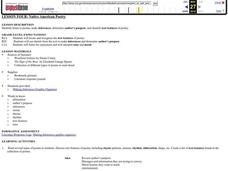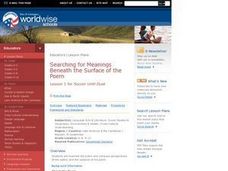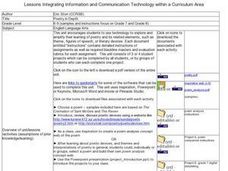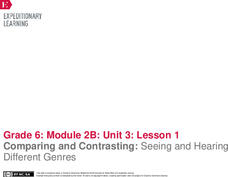EngageNY
Mid-Unit Assessment: Small Group Discussion: How Do Modern Poems Portray Modern Adversities?
How is a poem similar to and different from a news article? Pupils use a graphic organizer to compare and contrast the two genres. Also, as part of a mid-unit assessment, scholars participate in small-group discussions based on poetry...
Curated OER
Native American Poetry
Identify text features, make inferences, and discover the cultural significance of Native American Poetry. Sixth graders read several Native American poems and use graphic organizers and literature response logs to record their feelings...
EngageNY
Writing the Final Narrative: Monologue or Concrete Poem
Get inspired to help those creative juices flow. Using the resource, scholars write their final, best version of their narrative monologues or concrete poems. Next, they prepare for a performance task by watching and discussing a video...
Curated OER
Poetry in Song
Have your music lovers examine song lyrics and identify the poetry elements or tools used by a lyricist. They review the song individually before working in groups to discuss what they discovered about the song's narrator or character...
Curated OER
Writing and Autobiography
Are you working on an autobiographical or narrative writing unit? Bring this lesson to your class, as it takes young writers through the process of drafting and sequencing an autobiography. After observing and demonstrating steps of the...
Curated OER
Playing Vocabulary Basketball
Learners view a slide show featuring famous athletes and educational institutions that have played a part in the history of basketball. They participate in a game in which a basketball is tossed from person to person as facts and...
Curated OER
Searching for Meanings Benath the Surface of the Poem
Students read "Soccer Until Dusk". As a class, they discuss the various settings and actions in the poem and discuss the life in Guatemala and compare it with the United States. To end the instructional activity, they complete a...
Curated OER
Teaching Selected Poems from Jim Wayne Miller's the Brier Poems
Students explore the basic elements of poetry through Appalachian life poetry. In this poetry lesson, students read seven poems from Jim Wayne Miller's the Brier Poems and complete poetry analysis activities for each poem.
Curated OER
Poetry in Depth
Scholars use technology to explore poetry and its related elements, such as theme, figures of speech, and other literary devices. They complete four poetry projects including a poem analysis with a concept web, an interactive poem...
Scholastic
Reading Poems From the Academy of American Poets Chancellors
Start a lesson on poetic voice with a peer to peer discussion on what characterizes the strength in the voice with which a writer chooses to express himself/herself. In pairs, readers are tasked with reading and creating T-charts for...
National Endowment for the Humanities
“The Great Migration” by Minnie Bruce Pratt
Minnie Bruce Pratt's poem, "The Great Migration," offers young scholars an opportunity to reflect on how where we come from influences who we are. Groups conduct a close reading of the poem, recording observations about the poem's...
Scholastic
Selecting Favorite Poems From Historical Poets
Here is a poetry instructional activity that begins with a free-association activity focused on the word voice. Learners each sit alone for a moment and make sounds that express how they are currently feeling, and then turn to their...
Facing History and Ourselves
Speaking Up and Speaking Out
The final lesson in the Standing Up for Democracy unit offers class members a way they can stand up and speak out by crafting spoken word poetry, or Slam poetry. After analyzing several examples, individuals reflect on one positive...
National Endowment for the Humanities
“Every Day We Get More Illegal” by Juan Felipe Herrera
A study of Jan Felipe Herrera's poem "Every Day We Get More Illegal" opens the door for a discussion on immigration. To begin, class members examine the photograph "Desert Survival," record their observations of the image, and then...
Learning for Justice
Maya Angelou
Maya Angelou's poem, "Still I Rise", offers young scholars an opportunity to consider how poets use literary devices to create powerful messages. After a close reading and discussion of the poem, class members reflect on how they can...
Curated OER
ESL Poetry Unit
Students complete a twelve lesson unit on poetry. They read and respond to different forms of poetry, write a bio poem, complete an online WebQuest, and in small groups present lessons to the class on various types of poems.
Curated OER
Discovering Angel Island: The Story Behind the Poems
Learners watch a video titled Discovering Angel Island: The Story Behind the Poems about immigrants that came through Angel Island. In this Angel Island lesson plan, students respond with a journal entry.
Curated OER
Henry Wadsworth Longfellow's Christmas Bells
Students read and analyze the anti-slavery poem, "Christmas Bells" by Henry Wadsworth Longfellow. They discuss the content and form of the poem, write an essay, write an original poem, examine how this anti-slavery poem was converted...
Curated OER
Using Prepositional Phrases
The class reads the book Heckedy Peg. Stopping to point out the prepositional phrases, the teacher models and guides the young scholars to deeper comprehension. Small groups collaborate to read A Sweet Smell of Roses. They thenfind the...
EngageNY
Looking Closely at Stanza 1—Identifying Rules to Live By Communicated in “If”
Here is a lesson plan in which pupils connect themes and rules to live by from the story Bud, Not Buddy by Christopher Paul Curtis to those found in the poem If by Rudyard Kipling. First, scholars discuss their reading and review Bud's...
EngageNY
Introducing “If” and Noting Notices and Wonders of the First Stanza
After reading chapter 14 of the story Bud, Not Buddy by Christopher Paul Curtis, scholars take part in a read-aloud of the poem If by Rudyard Kipling and compare it to the reading of Bud, Not Buddy. Learners then go deeper into the poem...
EngageNY
Notices, Wonders, and Vocabulary of the Third Stanza of “If”
How does one's experience reading a poem's text differ from listening to its audio version? Delve into the insightful question with the poem, If by Rudyard Kipling, as pupils compare and contrast their experience using a note-taking...
EngageNY
Looking Closely at Stanza 3—Identifying Rules to Live By Communicated in “If”
Just as Bud, from the novel Bud, Not Buddy by Christopher Paul Curtis, had rules to live by, so does the poem, If by Rudyard Kipling, but how do the two relate? Pupils delve deep into the poem's third stanza, participate in a grand...
EngageNY
Comparing and Contrasting: Seeing and Hearing Different Genres
Let's compare and contrast! Scholars use a Venn diagram to compare and contrast the experience of reading a poem and listening to its audio version. Next, they complete graphic organizers, comparing two different genres: a poem and a...
Other popular searches
- 6th Grade Poetry Unit
- 2nd Grade Poetry Unit
- 3rd Grade Poetry Unit
- 7th Grade Poetry Unit
- 5th Grade Poetry Unit
- Poetry Unit Plans
- Poetry Unit Grade Three
- Modern Poetry Unit
- Poetry Unit Rhyme
- Huge Poetry Unit
- African American Poetry Unit
- Poetry Unit Jack Prelutsky

























